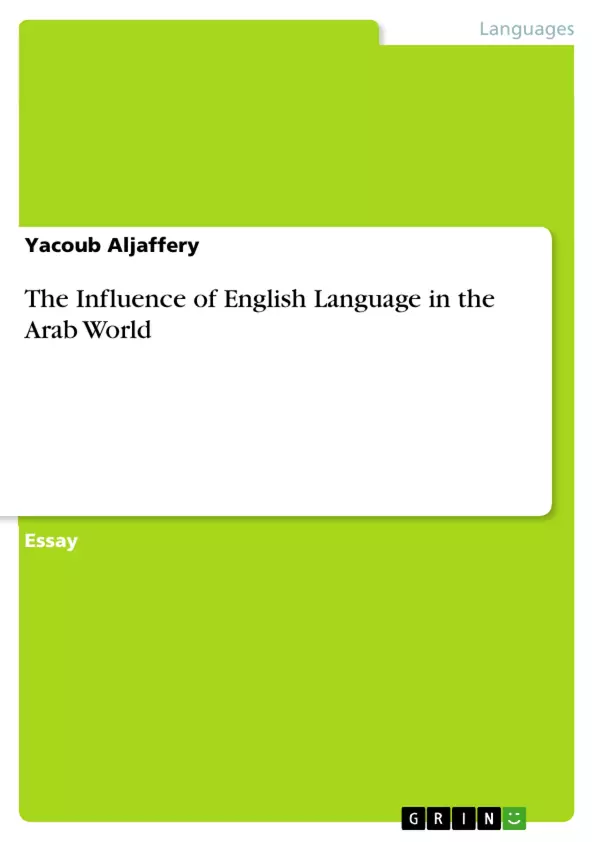Sometimes during the fifth century, the Quran that’s written in Arabic introduced the Arabic language to be the language of the Muslim empire that spread around the world: Nadvi (2003) “Arabic became the official language of a world empire whose boundaries stretched from the Oxus River in Central Asia to the Atlantic Ocean, and even northward into the Iberian Peninsula of Europe. As Islam continued to spread through the world, Arabic inherently followed.”(P. 2). Arabic became prestige because of the variety of sciences that were invented by Arabs like Chemistry, Algebra and Astronomy. Things have changed today, and the language that is mostly used around the world is the English language due to the advanced technology and the political power that USA, and the English speaking countries has in the world. Hollywood movies and pop culture have a big impact in spreading English language throughout the world. Middle Eastern countries, especially gulf countries like Saudi Arabia, UAE, Kuwait and Iraq have been heavily influenced by English Language in the last few years. Since Islam has urged people to learn other nations’ language for security purposes, English language has been taking big part of the Arabic speaking countries. That desire to learn other languages has increased since the second Gulf war in 2003.
Inhaltsverzeichnis (Table of Contents)
- The Spread of English Language in the Arab Speaking Countries
- The Influence of the Quran and the Prophet Muhammad
- The Impact of the Second Gulf War
- English Language and Iraqi Slang
- English Language in Iraq After the American War
- English Language in Iraqi Kurdistan
- The Rise of English Language Institutes
- The American University of Iraq
- The Influence of Hollywood and Pop Culture
- The Spread of English Language in Saudi Arabia
- The Shift in Educational Curriculum
- Conclusion
Zielsetzung und Themenschwerpunkte (Objectives and Key Themes)
This text examines the increasing prevalence of English language in Arab-speaking countries, focusing on the factors driving this trend. It explores the historical context, the role of religion, the impact of political events, and the influence of globalization and pop culture. * The historical context of Arabic's influence as the language of the Muslim empire and its current decline. * The role of Islam in encouraging language learning, particularly the importance of understanding other cultures. * The impact of the Second Gulf War and the subsequent American presence on the spread of English. * The influence of globalization, particularly the impact of American culture and technology, on the adoption of English. * The changing educational landscape in Arab-speaking countries, with English being introduced at earlier ages.Zusammenfassung der Kapitel (Chapter Summaries)
- This chapter introduces the topic of English language spread in Arab-speaking countries. It explains that while Arabic was once the dominant language of the Muslim empire, English has become the dominant language due to American influence. The chapter also discusses the historical significance of Arabic as the language of the Quran.
- This chapter explores the role of Islam in encouraging language learning. It cites verses from the Quran and sayings of the Prophet Muhammad that emphasize the importance of understanding other cultures and communicating with different groups.
- This chapter examines the impact of the Second Gulf War on the spread of English in Arab countries. It explains that the American presence in the region led to an increased need for English language proficiency, particularly for communication with soldiers and for employment opportunities.
- This chapter focuses on the impact of English on Iraqi slang. It discusses how English words have become integrated into Iraqi Arabic, particularly among younger generations. The chapter explores the process by which slang words evolve and become mainstream.
- This chapter continues the discussion of English language adoption in Iraq after the 2003 American war. It explains that English proficiency has become increasingly important for employment opportunities in Iraq, particularly in the construction industry. The chapter also discusses the opening of the first American University in Iraq.
- This chapter examines the spread of English language in Iraqi Kurdistan. It highlights the desire among young Kurds to learn English for employment and personal growth. The chapter discusses the increasing number of English language institutes in the region.
- This chapter explores the rise of English language institutes in Iraq, particularly after the overthrow of Saddam Hussein. The chapter also discusses the political motivation for promoting English education in Iraq, with the aim of creating a more modern and democratic society.
- This chapter explores the influence of Hollywood movies, music, and the internet on the spread of English language around the world, including in Arab-speaking countries. It highlights the role of pop culture in making English a globally recognized language.
- This chapter focuses on the spread of English in Saudi Arabia. It discusses the prevalence of English in various aspects of Saudi life, including television, music, and commerce. The chapter highlights the importance of English for education, science, and technology.
- This chapter examines the shift in educational curriculum in Arab-speaking countries, with English being introduced at earlier ages. The chapter discusses the increasing emphasis on English language education and the benefits of early exposure.
Schlüsselwörter (Keywords)
The primary focus of this text is the spread of English language in Arab-speaking countries, particularly in Iraq and Saudi Arabia. The key themes explored include the impact of globalization, cultural influence, political events, and the changing educational landscape. Other important concepts include the role of religion in language learning, the influence of American culture, and the evolving nature of slang and language.- Citation du texte
- Yacoub Aljaffery (Auteur), 2010, The Influence of English Language in the Arab World, Munich, GRIN Verlag, https://www.grin.com/document/288945



